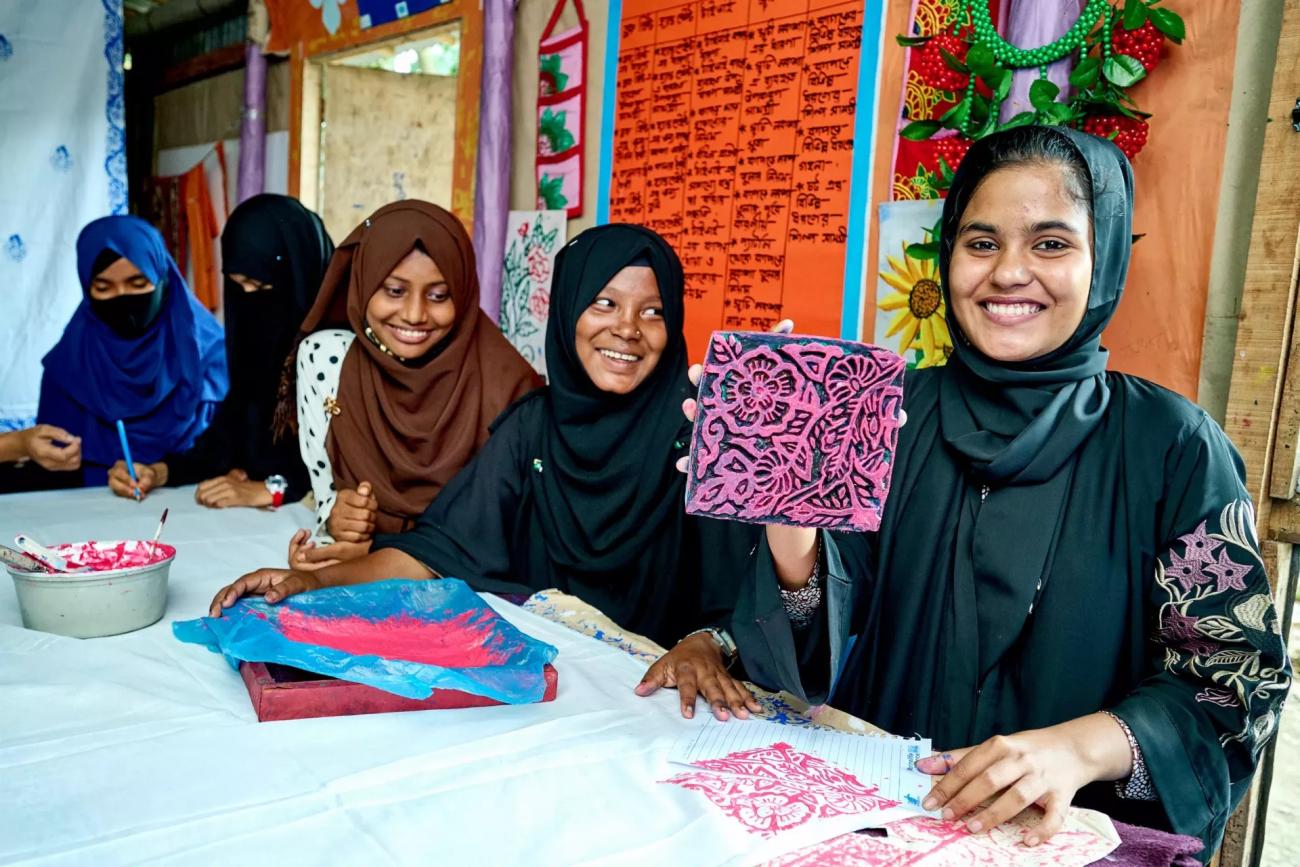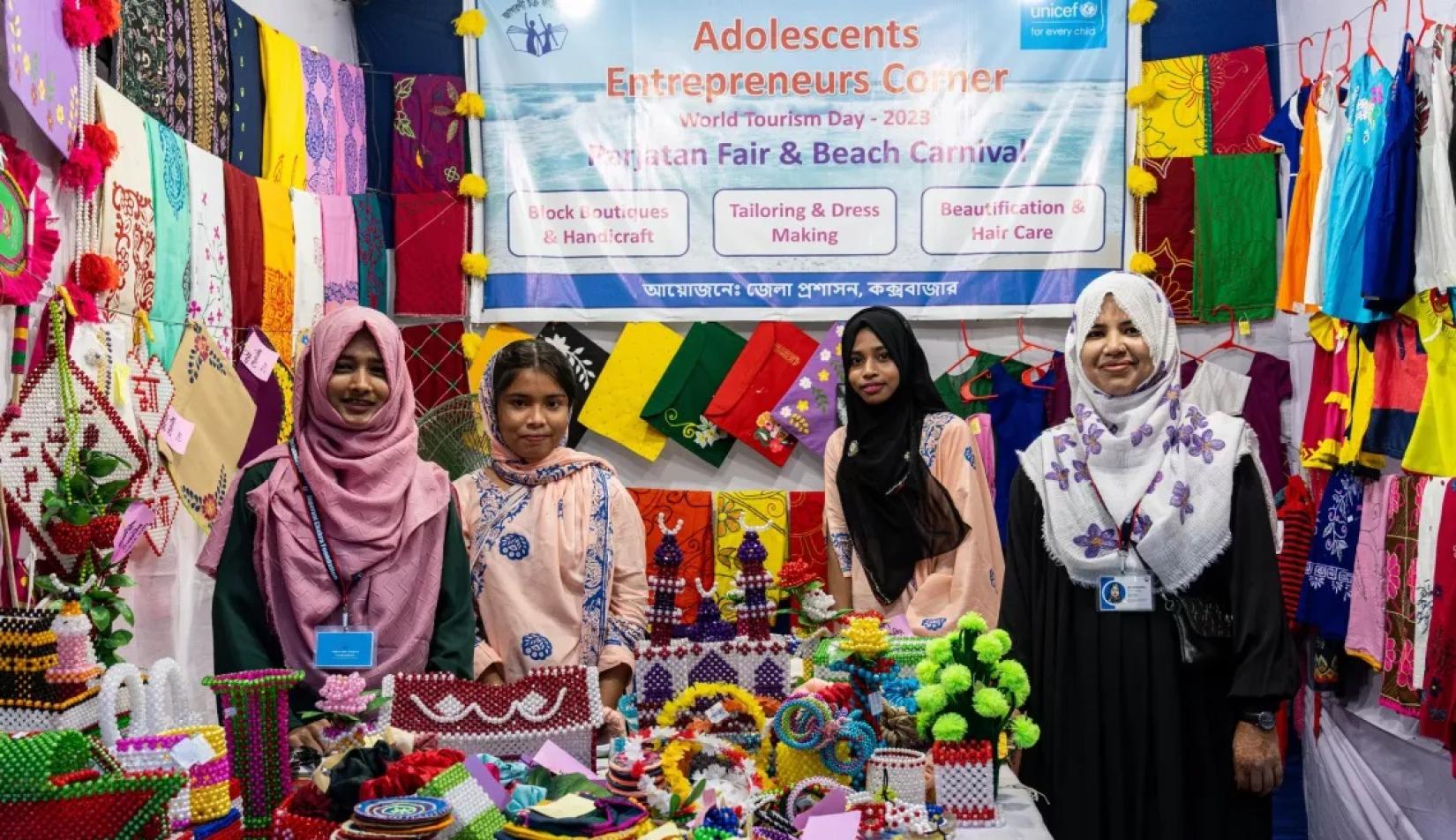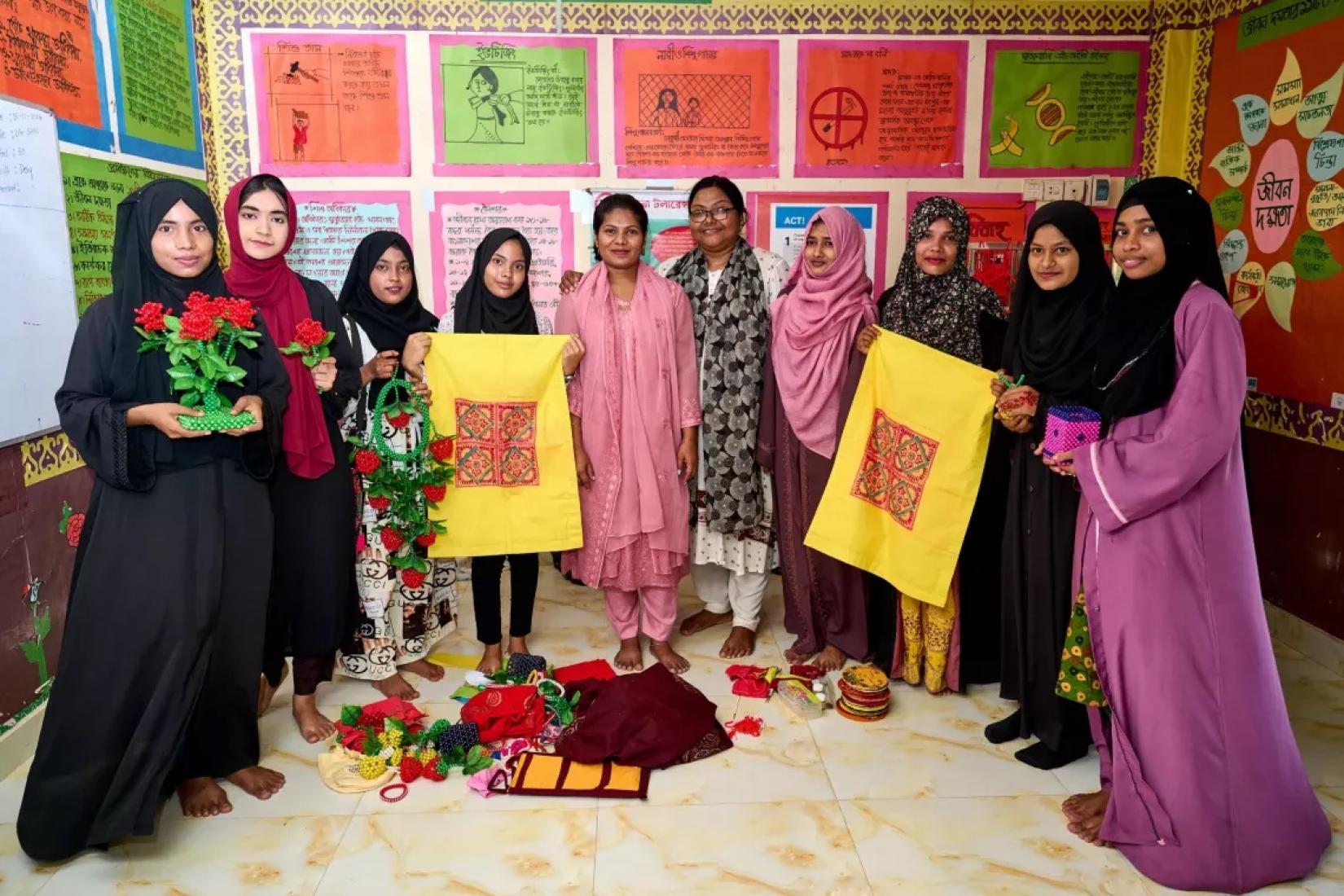Learning Skills and Entrepreneurship for Resilient Futures

Adolescent graduates of a UNICEF-supported skills development training shine at a local fair in Cox’s Bazar
19 December 2024
As the sun sets over Cox’s Bazar on a warm Tuesday evening, visitors flock to Laboni Beach Point to attend the International Tourist Fair. Among the fair’s 200 shops are 16-year-olds Nipa and Jesmin standing in front of two adjacent stalls filled with handcrafted wares that they and their peers created. As customers approach and peruse their selection, the two spring into action, answering questions and confidently advising them on their products.
For Nipa and Jesmin, the opportunity to showcase and sell their products at the fair is the culmination of months of hard work, which started at the nearby Samiti Para Multi-Purpose Centre. The centre, supported by UNICEF and funded by the European Union, provides alternative learning opportunities to vulnerable children and adolescents in Cox’s Bazar, such as Nipa and Jesmin, who dropped out of school early. They can learn valuable entrepreneurial skills there, including computer programming, handicrafts, block batik, handprint, hairdressing and beauty therapy.
“Most of the adolescents at the multi-purpose centre come from struggling families. Some have lost a parent, and others have difficulty making ends meet,” explains Shanta, an instructor at the centre. “The centre provides a rewarding opportunity for them to learn a skill and become a contributing family member.”
During the six-month skills development training, the adolescent girls learned to craft various items, including handbags, decorative tissue boxes, pen holders, matching couple sarees and Panjabi, laptop and smartphone pouches, blankets, and jewellery. Many have begun selling their products and services from their homes.
For the girls and boys facing financial challenges, the multi-purpose centres became more than places of learning; they offered a pathway to independence and empowerment.
“Our families are very proud that we are learning a skill,” the girls said during a group discussion. “We have become independent earners. Our parents feel thrilled now that we can contribute money to the family. They brag about us to our neighbours and relatives.”

A step towards independence
Recognizing the potential of her students and hoping to provide them with market exposure, Shanta secured two stalls at the weeklong tourism fair in Cox’s Bazar, opening the door to a remarkable experience for adolescent girls.
From home decor items to intricate handprinted clothes, the stalls displayed various products sourced from 16 different multi-purpose centres in five upazilas (sub-districts) in Cox’s Bazar. Jesmin and her peers from the beautician and hairdressing skill sessions provided henna art services. Armed with skills learned at a multi-purpose centre, the adolescents seized the opportunity to exhibit their creations at the fair.
“We never thought we would be able to set up a stall at a fair and showcase our handmade products,” said Sufiya, 17, who made laptop bags and bracelets that garnered significant demand. “I gained experience in customer service, communication, sales, and budgeting. Other learners from the computer skills training session came to the fair to support us. This has given us the courage and motivation to keep working on our craft.”
From learning basic handicrafts to selling products at a bustling fair, the journey became a turning point, instilling newfound confidence in the adolescents. For many, it was not just about showcasing their products; it was a momentous step towards independence.
“We were able to handle customers on our own at the fair, which we never did before,” the girls said. “We were a bit scared at first, but our instructors helped us. They taught us everything we needed to run a stall and cheered us on throughout. I am grateful to them for giving us this opportunity.”
The fair marked a milestone for the girls who aspire to learn advanced skills. The journey from learning basic handicrafts to selling products at a fair has fuelled their desire to become certified professionals.
"Some of us are planning to expand our business,” explained Nargis, 18. “We want to sit for the [national board] exam and get certified. Then we can use the certification to get jobs in renowned institutes.”
“We will not be coming to the multi-purpose centre after we graduate, so a certificate would help build trust so that we can get more customers and clients,” the girls pointed out.
The experience at the fair has become a cherished memory and a stepping stone for future aspirations.
“We learned the basics during the six months of training and would like to get advanced-level training,” the girls expressed. “We need to work under an expert for a few months to become experienced professionals. Maybe intern with relevant businesses already established in the market so we can learn more from them. We have the training, and would like to get professional experience now.”
Their success has inspired other girls in their community to pursue alternative learning opportunities. As Nipa, Jesmin, and their peers reflect on their experience at the fair, they find themselves better equipped to navigate the challenges. The lessons learned and confidence gained during those seven days have become invaluable assets in shaping their futures.

UNICEF wishes to express gratitude to the European Union for its support for both the host community and Rohingya refugee communities in Cox’s Bazar. Through this support, 1,680 adolescents and young people enrolled in vocational education and training at UNICEF-supported multi-purpose centres in Cox’s Bazar in 2024.






